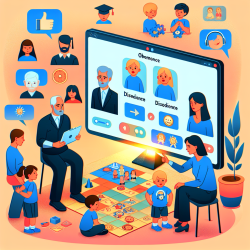Landau Kleffner Syndrome (LKS) is a rare neurological disorder that severely impacts a child's ability to understand and produce language. While traditional treatments often focus on medical interventions, recent research highlights the potential of cognitive linguistic treatment (CLT) to improve daily life communication for children with LKS. This blog will explore key findings from the research article "Cognitive Linguistic Treatment in Landau Kleffner Syndrome: Improvement in Daily Life Communication" and provide actionable insights for practitioners.
Understanding Cognitive Linguistic Treatment
CLT is grounded in cognitive linguistic language models and has shown efficacy in treating adult aphasia. The treatment involves thorough diagnostics to identify impaired language components, followed by targeted therapy to address these deficits. This approach is now being adapted for children with LKS, focusing on improving their communication skills in daily life.
Key Findings from the Research
The study investigated the effects of CLT on a teenager with chronic severe LKS. The treatment was divided into two intensive blocks, each targeting specific linguistic components:
- Vocabulary Expansion: Training functionally relevant words such as names of food and kitchen utensils.
- Oral Production: Using techniques like Melodic Intonation Therapy to facilitate the production of relevant words and phrases.
- Auditory Processing: Employing discrimination tasks to improve the understanding of spoken language.
- Sentence Production: Training simple, functionally relevant sentence templates.
Results and Implications
The results were promising:
- Vocabulary: The teenager successfully acquired and retained over 100 new words, even after months without therapy.
- Oral Production: There was a marked improvement in the articulation of trained words.
- Daily Life Communication: Significant improvement was observed in communicative functioning, as measured by the Scenario Test and spontaneous speech.
However, the study also noted limitations, particularly in generalizing improvements to untrained words and persistent auditory processing deficits.
Actionable Insights for Practitioners
Based on these findings, here are some recommendations for practitioners:
- Focus on Functionally Relevant Words: Select words and phrases that are crucial for the child's daily life.
- Intensive, Short-Term Therapy: Consider short, intensive blocks of therapy rather than prolonged, less frequent sessions.
- Monitor and Adapt: Continuously assess the child's progress and adapt the treatment plan as needed.
Encouraging Further Research
While the results are encouraging, more research is needed to optimize treatment for auditory processing deficits in children with LKS. Practitioners are encouraged to contribute to this growing body of evidence by conducting their own studies and sharing their findings.
To read the original research paper, please follow this link: Cognitive Linguistic Treatment in Landau Kleffner Syndrome: Improvement in Daily Life Communication.










